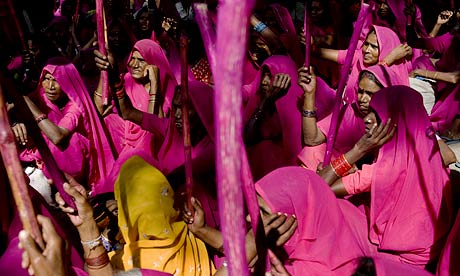|
Social Protection: From Handouts to Social Justice
By
Stephen Devereux, Guardian News
May 17, 2011
World

The gulabi gang (pink gang) in Delhi protesting for better
implementation of the National Rural Employment Guarantee scheme, a
social protection initiative. The women from rural India, social
justice campaigners who wear pink saris, are led by Sampat Devi.
Photograph: Manpreet Romana/AFP/Getty Images
Social
protection was recently described by Madeleine Bunting as "the next big
idea to combat poverty". At its simplest, social protection has been
implemented as welfarist support to poor people, mainly in countries
that have limited capacity to deliver comprehensive social welfare
programmes. Within the past decade, countries across Africa, Asia and
Latin America have introduced regular cash transfers and other
programmes to assist poor and vulnerable citizens, with positive
impacts on a range of wellbeing indicators for millions of people.
Social protection is indeed a phenomenal development success story.
Of
course, challenges remain. Critics from the political right claim that
large-scale cash transfer programmes are unaffordable and financially
unsustainable, especially in low-income countries where the costs are
often underwritten by the international community. In fact, budget
constraints are typically exaggerated – how governments allocate their
public spending is a political choice. Another complaint is that
putting poor people on to welfare programmes inevitably leads to
negative side-effects such as "dependency syndrome" – a common
criticism of the right wing in the UK – but there is little empirical
evidence to support this belief.
Meanwhile,
critics from the left say that social protection is a neoliberal con
trick – a residual social policy to legitimise neoliberal economic
policies and avoid radical structural reforms. In countries
characterised by high levels of poverty and inequality – as in South
Africa and much of Latin America, where extensive social protection
systems are in place – introducing targeted cash transfers or subsidies
for the poor is interpreted as a self-serving attempt by those in power
to buy off civil unrest. The limitations of this argument are evident
from recent events in Egypt, where decades of heavy food and fuel
subsidies failed to prevent revolution.
The
social protection discourse has been dominated by efforts to
demonstrate and measure its poverty-reduction impacts, and to deflect
criticisms from the right and left. But social protection is not only
about installing safety nets and contributing to the millennium
development goals – important though these are – it also has profound
implications for governance and social relations in implementing
countries. A conference hosted by the Institute of Development Studies
in April addressed a perception that insufficient attention has been
paid to the politics of social protection, and its relationship to
social justice. Several key lessons emerged.
Social
protection is much more than a service-delivery sector: the decisions a
society makes about how and whether to guarantee basic subsistence for
all citizens reveals the vision that society has about itself – is it
based on solidarity and interdependence, or individualism and
self-reliance? What constitutes a "good society" at a time when
neoliberal capitalism prevails and financial austerity offers a
convenient excuse to cut back on government spending? These questions
resonate in the UK and mainland Europe as much as they do in the
poorest countries.
What
are the implications of the social protection agenda for the evolving
social contract between governments and citizens? If there is no direct
line of accountability between the providers and beneficiaries of
social protection, the potential for mobilising civil society is
limited. This question is particularly pertinent in countries where
poverty and aid dependence mean that international donor agencies
dominate the design and financing of these interventions.
Social
protection must be delivered in ways that do not stigmatise people:
social protection programmes need to respect the dignity of claimants
and empower them to become active citizens rather than passive
beneficiaries. In India, "social audits" are innovative participatory
tools that empower marginalised villagers to claim their right to
social protection, and to hold local administrations accountable for
their delivery.
Social
protection should be linked to other dimensions of social policy, such
as tackling discrimination and social exclusion, which are often the
root causes of poverty: eradicating social injustice can eliminate a
need for welfare transfers. For instance, is it better to deny an
HIV-positive person work and compel them to depend on social
protection, or to outlaw discrimination in the labour market based on
HIV status, as South Africa has done?
The
most progressive social protection interventions are underpinned by
legislation, which transforms a charitable gesture into a justiciable
right: in India, the Mahatma Gandhi National Rural Employment Guarantee
Act gives every rural household the right to 100 days of public works
employment each year. In Swaziland, where pensions were introduced for
all older citizens in 2005, a delay in payments due to cashflow
problems provoked aggrieved pensioners to lobby their MPs, and
parliament was suspended until the issue was resolved.
In
small but significant ways like this across the world, social
protection is not only protecting poor and vulnerable people, it is
also building democracy from the bottom up. Social protection can be a
powerful tool for strengthening citizens' rights and achieving social
justice.
Copyright © Global Action on Aging
Terms of Use
|
Privacy Policy
|
Contact Us
|



